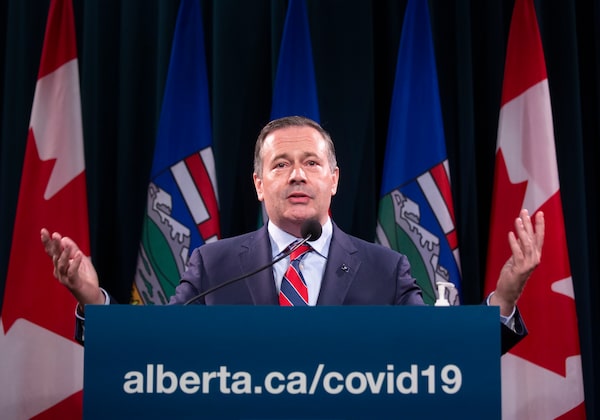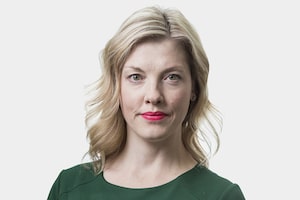
Alberta Premier Jason Kenney answers questions at a news conference where the provincial government announced new restrictions because of the surging COVID cases in the province, in Calgary, Friday, Sept. 3, 2021.Todd Korol/The Canadian Press
Alberta is the opposite of Quebec – where parties face ever-changing fortunes – or the nail-biting-close races of the GTA. Outside of a few key constituencies in Calgary and Edmonton, there are rarely surprises. When the votes are tallied, most of the province’s 34 ridings go to the Conservatives.
And because of that predictability, Conservative Leader Erin O’Toole and Liberal Leader Justin Trudeau made only brief stops in the province, early in the campaign – checking Alberta off their list when their time was less dear. The Liberals won another minority government Monday, and the party was expected to pick up at least one seat in the province with former city councillor George Chahal projected to win in Calgary-Skyview. But one thing was certain: Once again, the oil-producing province doesn’t have much when it comes to representation in the governing federal caucus.
Still, when it comes to issues such as climate change or COVID-19, Alberta has played an outsized role in the federal campaign. And even in the province itself, there are signs political change is possible. On the weekend, NDP Leader Jagmeet Singh made another swing through Alberta and Saskatchewan to meet with health care workers, and to give a boost to the campaigns of strong candidates like Blake Desjarlais in Edmonton Griesbach and Robert Doucette in Saskatoon West.
Even if leaders didn’t spend a lot of time here, one of the biggest issues of the 36-day campaign – how the country should address climate change – is potentially the most consequential to Alberta.
In other parts of the country, climate change is a discussion of consumer carbon prices, reducing transportation emissions and adaptation. In Alberta and Saskatchewan, it’s about all those things. But climate policies come down on the two provinces in a much heavier way.
Climate here also includes carbon capture and storage, and complicated formulas for reducing the region’s significant industrial emissions. Canada also needs policies that address the economic uncertainty facing oil dependent regions in the years ahead, or whether Canada is a place that allows for any new investment in Canadian oil and gas production – even with net-zero policies.
Mr. O’Toole scratched the surface of this with lines such as, “All Canadian families deserve an economic recovery, including families in Western Canada.” The Liberals have in their policy a $2-billion transition fund for workers in Alberta, Saskatchewan and Newfoundland and Labrador – but none of this featured too prominently in climate debates, or through the course of the campaign.
For many Alberta voters, it was hard to maintain any focus on the horse race of the campaign when the COVID-19 crisis in hospitals has resulted in cancer surgeries being postponed and ICU staff training in triage protocols.
On the national stage, the acute stress on the province’s health care system has been an unfortunate symbol of what can go wrong instead of being an emergency at the forefront of the campaign.
But it has became a major political problem for Mr. O’Toole – whose Conservative leadership campaign won a key bit of momentum from Alberta Premier Jason Kenney’s endorsement in prepandemic 2020. Mr. O’Toole had earlier praised parts of Alberta’s COVID-19 response. Mr. Kenney is now likely the country’s least popular premier, facing great internal dissent within his governing United Conservative Party, and presiding over the worst capacity disaster in the history of the province’s health care system.
Pollsters spent time following the 2019 federal election dissecting how much influence Ontario Premier Doug Ford’s unpopularity had on the outcome in key GTA ridings. This time, pollsters will likely try to gauge whether what happened in Alberta affected Mr. O’Toole’s chances in the final days of the campaign – in ridings across the country.
The question won’t only be whether centrist voters in the rest of Canada were frightened off from voting Conservative by what is happening in real time in Alberta. It will also be about the last weekend of the campaign, when Maxime Bernier held a series of rallies in Alberta to speak directly to a minority of residents who oppose most health restrictions and any type of vaccine mandates.
Mr. Bernier is, of course, hoping to sway disgruntled Conservatives to his People’s Party of Canada, which has opposed mandatory vaccination. And after it’s all said and done, another question pollsters will have to ask is whether Mr. Kenney’s late conversion to a vaccine passport system for Alberta resulted in the vote-splitting on the right that Mr. O’Toole spent the final days of the campaign warning about.
Our Morning Update and Evening Update newsletters are written by Globe editors, giving you a concise summary of the day’s most important headlines. Sign up today.
 Kelly Cryderman
Kelly Cryderman